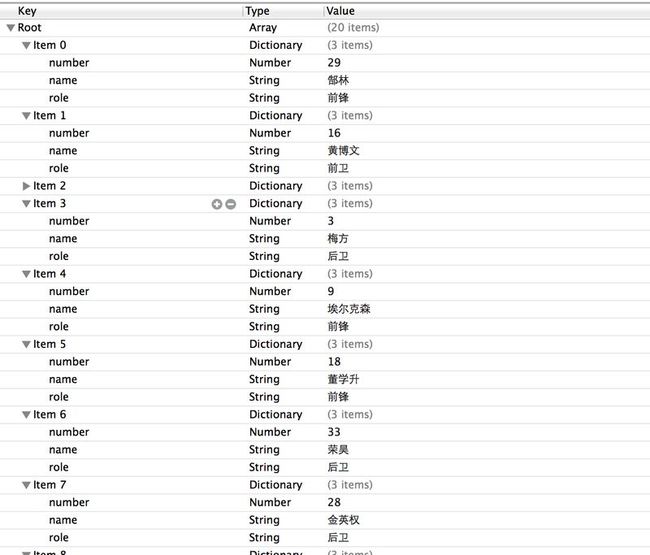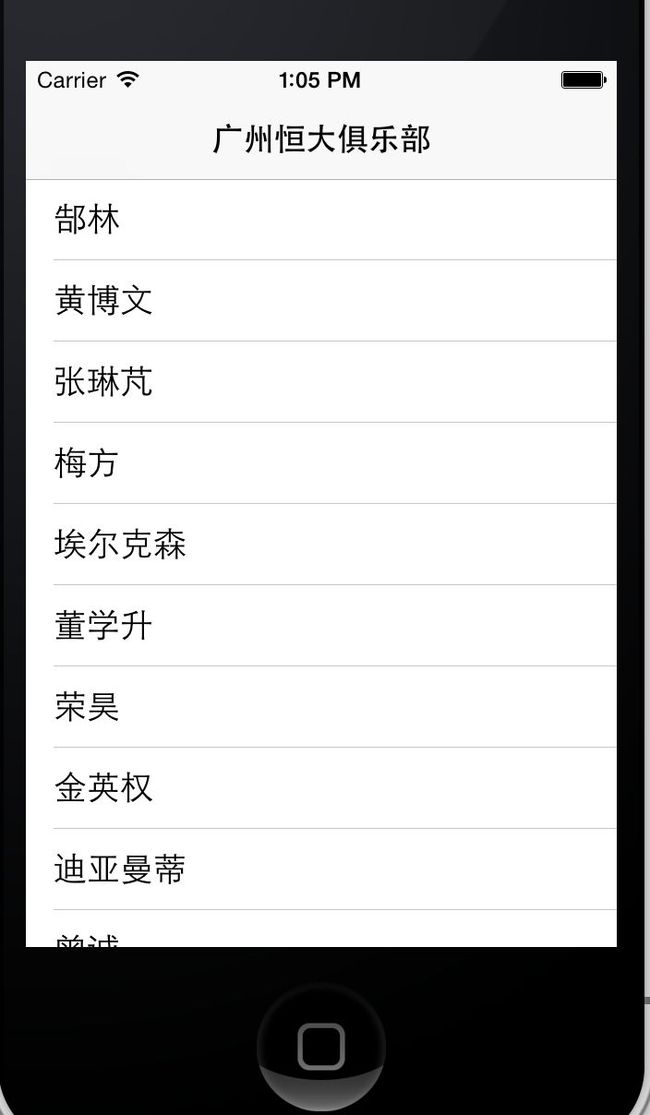- UI学习——cell的复用和自定义cell
Magnetic_h
ui学习
目录cell的复用手动(非注册)自动(注册)自定义cellcell的复用在iOS开发中,单元格复用是一种提高表格(UITableView)和集合视图(UICollectionView)滚动性能的技术。当一个UITableViewCell或UICollectionViewCell首次需要显示时,如果没有可复用的单元格,则视图会创建一个新的单元格。一旦这个单元格滚动出屏幕,它就不会被销毁。相反,它被添
- Flutter学习之九 ListView
MQ_Twist
极端很容易,平衡才是最难的。Flutter学习之八Container前言Flutter中的ListView的地位,就好比于iOS中的UITableView,算是最常用的可滚动组件之一,它可以沿一个方向线性排布所有子组件,并且它也支持列表项懒加载(在需要时才会创建)。默认构造函数我们看看ListView的默认构造函数定义:ListView({...//可滚动widget公共参数AxisscrollD
- iOS使用UIScrollView实现左右滑动UITableView和UICollectionView
泥孩儿0107
ios开发
iOS使用UIScrollView实现左右滑动UITableView和UICollectionView标签:iOS左右滑动UIScrollViewUICollectionView在UIScrollView中嵌套UITableView的文章很多,但是项目需要,需要嵌套UICollectionView,而UICollectionView和UITableView有很多不同,有些知识到现在也没搞清楚,一遍
- 简单实现浮动按钮+上滑隐藏按钮+下滑显示按钮
AlanGe
#import"SlideShowOrHideVC.h"@interfaceSlideShowOrHideVC(){CGFloatlastContentOffset;BOOLhideBtn;BOOLisBottom;}@property(nonatomic,strong)UITableView*tableView;@property(nonatomic,strong)UIButton*myButt
- IOS 21 发现界面(UITableView)单曲列表(UITableView)实现
sziitjin
IOSiosUITableView
发现界面完整效果本文实现歌单列表效果文章基于IOS20发现界面(UITableView)歌单列表(UICollectionView)实现继续实现发现界面单曲列表效果单曲列表Cell实现实现流程:1.创建Cell,及在使用UITableView的Controller控制器上注册Cell;2.获取data列表数据,并调用UITableView的reloadData(),将数据更新到列表;3.将data
- Swift Cell重用池机制以及UINib
司南_01b7
functableView(_tableView:UITableView,cellForRowAtindexPath:IndexPath)->UITableViewCell{letreuseID="taskCell5555555"//务必填写模版nib名(此处仅限于有cell模版,若无可忽略)letnib=UINib(nibName:"test5TableViewCell",bundle:nil)
- IOS 20 发现界面(UITableView)歌单列表(UICollectionView)实现
sziitjin
IOSiosUITableViewCollectionView
发现界面完整效果本文实现歌单列表效果文章基于IOS19发现界面(UITableView)快捷按钮实现继续实现发现界面歌单列表效果歌单列表Cell实现实现流程:1.创建Cell,及在使用UITableView的Controller控制器上注册Cell;2.获取data列表数据,并调用UITableView的reloadData(),将数据更新到列表;3.将data的Item数据绑定UITableVi
- tableView reloadData 刷新结束后再执行后续操作
wg刚
[self.tableViewreloadData]并不会等待tableview更新结束后才执行后续代码,而是立即执行后续代码做个试验:代码如下@interfaceViewController()@property(nonatomic,strong)UITableView*tableView;@property(nonatomic,strong)NSArray*dataArr;@end@imple
- 关于UITableView的Cell复用
bidianzhang
iOS工作数据结构iphoneios手机
UITableView是ios开发中使用率极高的一个控件,就我个人来说,几乎我做的每一个View上都有她的身影。但是很长一段时间,我对她的理解都很肤浅。对我来说触动较大的两个东西,一个是前面提到的自定义UITableViewCell,再有就是今天要提的这个复用了。
所谓复用表面意思来理解就是重复利用了。大致的工作原理就是:UITableView属于lazyloading,也就是只加载会在界面上显示
- iOS总体框架介绍和详尽说明
诗雅颂
ios移动端框架苹果
iOS是由苹果公司开发的移动操作系统,为iPhone、iPad、iPodTouch等设备提供支持。iOS采用了基于Unix的核心(称为Darwin),并采用了类似于MacOSX的图形用户界面。以下是iOS的总体框架介绍和详尽说明:UIKit框架:UIKit是构建iOS应用程序用户界面的主要框架。它包括了各种视图控制器(如UITableViewController、UIViewController)
- UICollectionView使用
搬砖行家
首先我们自定义一个UICollectionViewCell,和自定义UITableViewCell差不多,只是这里定义的是一个网格。-(id)initWithFrame:(CGRect)frame{self=[superinitWithFrame:frame];if(self){//设置CollectionViewCell中的图像框self.imageView=[[UIImageViewalloc
- UITableView实时刷新失效问题解决
风雪山神喵
要完成的UITableView是:能够在点击了UICollectionView的item之后,刷新自己。很长一段时间,都在迷惑,为什么不能点了一下之后,就能够展示正确的数据?要点很多下,点的头都晕了。。。其实解决方法是://消除数据延迟导致的失灵[selectedDayArrremoveAllObjects];[mytableViewreloadData];这样子,也有问题,就是刷新了两次。实际的
- 11、UITableView 的优化
十二月_9d09
1、正确的复用cell;2、设计统一规格的cell;3、提前计算并缓存好cell的高度(布局),因为heightForRowAtIndextPath方法是调用最频繁的方法;4、异步绘制,遇到复杂界面、遇到性能瓶颈时,往往是突破口;5、滑动时按需加载,这个在大量图片展示、网络加载的时候很管用;6、减少子视图的层级关系;7、尽量使所有的视图不透明化以及做切圆操作;8、尽量不要动态地add或remove
- View层规范
紫藤花的魂
在viewController代码里面#pragmamark-lifecycleviewDidLoadviewWillAppear...#pragmamark-UITableViewDelegatemethods#pragmamark-CustomDelegatemethods#pragmamark-eventresponse-(void)didTappedConfirmButton:(UIBut
- 'NSUnknownKeyException', reason: '[ setValue:forUndefinedKe...
叶舞清风
无语了屏幕快照2018-12-21下午3.59.59.png屏幕快照2018-12-21下午4.02.34.png[图片上传失败...(image-ff7e18-1545379428606)]
- UITableViewCell嵌套UICollectionView
myk
UITableView和UICollection的嵌套使用1.在控制器中创建TableView,设置数据源和代理-(void)viewDidLoad{[superviewDidLoad];self.arrData=[NSMutableArrayarrayWithObjects:@"末",@"将",@"于",@"禁",@"愿",@"为",@"曹",@"家",@"世",@"代",@"赴",@"汤",@
- iOS UITableViewCell 多选时改变编辑状态图片
浅宇落
UITableViewCell编辑状态时会出现多选按钮,最近项目有需求这里要改成自己的图片和去掉一下点击效果,总结一下:最终结果最终结果.png1.创建一个继承与UITableViewCell的类EditCellEditCell.h#importNS_ASSUME_NONNULL_BEGIN@interfaceEditCell:UITableViewCell/**下标数*/@property(no
- 设计模式
灰溜溜的小王子
一、编程中的六大设计原则?1.单一职责原则通俗地讲就是一个类只做一件事1.CALayer:动画和视图的显示。2.UIView:只负责事件传递、事件响应。2.开闭原则对修改关闭,对扩展开放。要考虑到后续的扩展性,而不是在原有的基础上来回修改3.接口隔离原则使用多个专门的协议、而不是一个庞大臃肿的协议,例如tableView的代理和数据源代理:UITableviewDelegate,UITableVi
- ios UITableView 使用UITableViewStyleGrouped(分组类型)顶部会有留白处理方式
90后的晨仔
方法一:CGRectframe=CGRectMake(0,0,0,CGFLOAT_MIN);self.tableView.tableHeaderView=[[UIViewalloc]initWithFrame:frame];方法二:CGRectframe=CGRectMake(0,0,0,0.0001);self.tableView.tableHeaderView=[[UIViewalloc]in
- SwiftUI -- 取消List的分割线
jancywen
iOS13List的底层是UITableView,可以直接设置UITableView的separatorStyle为none来去除分割线在iOS14中List的实现不在是UITableView了,可以设置.listStyle(SidebarListStyle()),但会有很大的边距。也可以用Scrollview+LazyVStack替代List,Thestackis"lazy,"inthatthe
- tableview
花开半夏又一年
tableview自适应高度functableView(_tableView:UITableView,heightForRowAtindexPath:IndexPath)->CGFloat{switchindexPath.section{case0:return250default:returnUITableView.automaticDimension}}方法二:functableView(_t
- UIRefreshControl
絮语时光杨
UIRefreshControl是iOS6自带的UITableView下拉刷新控件。(instancetype)init;@property(nonatomic,readonly,getter=isRefreshing)BOOLrefreshing;@property(null_resettable,nonatomic,strong)UIColor*tintColor;@property(null
- 代码规范
YannChee
ViewController的代码结构划分以后可以按如下#pragmamark-lifecycle#pragmamark-UITableViewDelegate#pragmamark-CustomDelegate#pragmamark-EventResponse#pragmamark-PrivateMethods(后期往往需要抽取重构的部分)#pragmamark-Getter&Setter
- 表格——swift
呵邢
classMovieViewController:UIViewController,UITableViewDataSource,UITableViewDelegate{//表格属性vartable:UITableView=UITableView(frame:CGRect(x:0,y:0,width:scrWidth,height:scrHeight),style:UITableViewStyle.
- iOS13 Compositional Layout
LINGSHOW
阅读原文前言UITableView和UICollectionView是我们开发者最常用的控件了,大量的流式布局需要这两个控件来实现,因此这两个控件也是Apple重点优化的对象。在往届WWDC中,我们已经受益于UITableViewDataSourcePrefetching、优化版Autolayout等带来的性能提升,以及UITableViewDragDelegate带来的原生拖拽功能。今年,App
- UITableView方法的执行顺序
Rumbles
1.它会调用代理方法确定有几行[TableViewControllernumberOfSectionsInTableView:]2.确定每行的表头高和表尾高(如果设定了HeardView和FooterView)[TableViewControllertableView:heightForHeaderInSection:][TableViewControllertableView:heightFor
- iOS tableViewCell最右边显示箭头,字符,自定义分割线
Lee坚武
效果如图:image.png1.添加iOS系统自带的cell的箭头cell.accessoryType=UITableViewCellAccessoryDisclosureIndicator;2.去掉tableviewcell的间隔下划线_tableView.separatorStyle=UITableViewCellSeparatorStyleNone;3.添加自定义间隔线,加在下面的这个方法里
- UITableView 轻松自定义多选cell 不使用系统样式
Adgerc
1、先看效果UITableView.gif2、需要什么效果1.点击全选需要全选cell2.在全选状态下,取消任意一个,全选按钮为normal转态3.一个一个选择,直到全部选择,全选按钮为selected状态3、实现3.1.在cell中添加一个按钮或者图片,用来显示选择或者未选择中的转态,在初始化时默认设为未选择的转态或者图片,和透明度为0或hidden=YES,我使用的是按钮做这个状态的现实,只需
- iOS开发笔记-113:兼容ios14
原味蛋炒饭
1:iOS14中UITableViewCell如果子控件是加到cell上的会被cell的contentView所遮挡,contentView会在最上层。所以按钮UIbutton之类的要加在contentView上2:刘海屏statusBarFrame.size.height由44变成了48
- 设计模式
荷码人生
六大设计原则:单一职责原则、依赖倒置原则、开闭原则、里氏替换原则、接口隔离原则、迪米特法则;单一职责原则:一个类只负责一个事(UIView,Calayer)开闭原则:对修改关闭、对扩展开发。(避免对类的反复修改,类的数据结构设定后,可利用扩展的方式,修改)接口隔离原则:(UITableView的两个协议)使用多个专门协议,避免庞大协议:dataSource(数据源),delegate(回调代理事件
- ViewController添加button按钮解析。(翻译)
张亚雄
c
<div class="it610-blog-content-contain" style="font-size: 14px"></div>// ViewController.m
// Reservation software
//
// Created by 张亚雄 on 15/6/2.
- mongoDB 简单的增删改查
开窍的石头
mongodb
在上一篇文章中我们已经讲了mongodb怎么安装和数据库/表的创建。在这里我们讲mongoDB的数据库操作
在mongo中对于不存在的表当你用db.表名 他会自动统计
下边用到的user是表明,db代表的是数据库
添加(insert):
- log4j配置
0624chenhong
log4j
1) 新建java项目
2) 导入jar包,项目右击,properties—java build path—libraries—Add External jar,加入log4j.jar包。
3) 新建一个类com.hand.Log4jTest
package com.hand;
import org.apache.log4j.Logger;
public class
- 多点触摸(图片缩放为例)
不懂事的小屁孩
多点触摸
多点触摸的事件跟单点是大同小异的,上个图片缩放的代码,供大家参考一下
import android.app.Activity;
import android.os.Bundle;
import android.view.MotionEvent;
import android.view.View;
import android.view.View.OnTouchListener
- 有关浏览器窗口宽度高度几个值的解析
换个号韩国红果果
JavaScripthtml
1 元素的 offsetWidth 包括border padding content 整体的宽度。
clientWidth 只包括内容区 padding 不包括border。
clientLeft = offsetWidth -clientWidth 即这个元素border的值
offsetLeft 若无已定位的包裹元素
- 数据库产品巡礼:IBM DB2概览
蓝儿唯美
db2
IBM DB2是一个支持了NoSQL功能的关系数据库管理系统,其包含了对XML,图像存储和Java脚本对象表示(JSON)的支持。DB2可被各种类型的企 业使用,它提供了一个数据平台,同时支持事务和分析操作,通过提供持续的数据流来保持事务工作流和分析操作的高效性。 DB2支持的操作系统
DB2可应用于以下三个主要的平台:
工作站,DB2可在Linus、Unix、Windo
- java笔记5
a-john
java
控制执行流程:
1,true和false
利用条件表达式的真或假来决定执行路径。例:(a==b)。它利用条件操作符“==”来判断a值是否等于b值,返回true或false。java不允许我们将一个数字作为布尔值使用,虽然这在C和C++里是允许的。如果想在布尔测试中使用一个非布尔值,那么首先必须用一个条件表达式将其转化成布尔值,例如if(a!=0)。
2,if-els
- Web开发常用手册汇总
aijuans
PHP
一门技术,如果没有好的参考手册指导,很难普及大众。这其实就是为什么很多技术,非常好,却得不到普遍运用的原因。
正如我们学习一门技术,过程大概是这个样子:
①我们日常工作中,遇到了问题,困难。寻找解决方案,即寻找新的技术;
②为什么要学习这门技术?这门技术是不是很好的解决了我们遇到的难题,困惑。这个问题,非常重要,我们不是为了学习技术而学习技术,而是为了更好的处理我们遇到的问题,才需要学习新的
- 今天帮助人解决的一个sql问题
asialee
sql
今天有个人问了一个问题,如下:
type AD value
A
- 意图对象传递数据
百合不是茶
android意图IntentBundle对象数据的传递
学习意图将数据传递给目标活动; 初学者需要好好研究的
1,将下面的代码添加到main.xml中
<?xml version="1.0" encoding="utf-8"?>
<LinearLayout xmlns:android="http:/
- oracle查询锁表解锁语句
bijian1013
oracleobjectsessionkill
一.查询锁定的表
如下语句,都可以查询锁定的表
语句一:
select a.sid,
a.serial#,
p.spid,
c.object_name,
b.session_id,
b.oracle_username,
b.os_user_name
from v$process p, v$s
- mac osx 10.10 下安装 mysql 5.6 二进制文件[tar.gz]
征客丶
mysqlosx
场景:在 mac osx 10.10 下安装 mysql 5.6 的二进制文件。
环境:mac osx 10.10、mysql 5.6 的二进制文件
步骤:[所有目录请从根“/”目录开始取,以免层级弄错导致找不到目录]
1、下载 mysql 5.6 的二进制文件,下载目录下面称之为 mysql5.6SourceDir;
下载地址:http://dev.mysql.com/downl
- 分布式系统与框架
bit1129
分布式
RPC框架 Dubbo
什么是Dubbo
Dubbo是一个分布式服务框架,致力于提供高性能和透明化的RPC远程服务调用方案,以及SOA服务治理方案。其核心部分包含: 远程通讯: 提供对多种基于长连接的NIO框架抽象封装,包括多种线程模型,序列化,以及“请求-响应”模式的信息交换方式。 集群容错: 提供基于接
- 那些令人蛋痛的专业术语
白糖_
springWebSSOIOC
spring
【控制反转(IOC)/依赖注入(DI)】:
由容器控制程序之间的关系,而非传统实现中,由程序代码直接操控。这也就是所谓“控制反转”的概念所在:控制权由应用代码中转到了外部容器,控制权的转移,是所谓反转。
简单的说:对象的创建又容器(比如spring容器)来执行,程序里不直接new对象。
Web
【单点登录(SSO)】:SSO的定义是在多个应用系统中,用户
- 《给大忙人看的java8》摘抄
braveCS
java8
函数式接口:只包含一个抽象方法的接口
lambda表达式:是一段可以传递的代码
你最好将一个lambda表达式想象成一个函数,而不是一个对象,并记住它可以被转换为一个函数式接口。
事实上,函数式接口的转换是你在Java中使用lambda表达式能做的唯一一件事。
方法引用:又是要传递给其他代码的操作已经有实现的方法了,这时可以使
- 编程之美-计算字符串的相似度
bylijinnan
java算法编程之美
public class StringDistance {
/**
* 编程之美 计算字符串的相似度
* 我们定义一套操作方法来把两个不相同的字符串变得相同,具体的操作方法为:
* 1.修改一个字符(如把“a”替换为“b”);
* 2.增加一个字符(如把“abdd”变为“aebdd”);
* 3.删除一个字符(如把“travelling”变为“trav
- 上传、下载压缩图片
chengxuyuancsdn
下载
/**
*
* @param uploadImage --本地路径(tomacat路径)
* @param serverDir --服务器路径
* @param imageType --文件或图片类型
* 此方法可以上传文件或图片.txt,.jpg,.gif等
*/
public void upload(String uploadImage,Str
- bellman-ford(贝尔曼-福特)算法
comsci
算法F#
Bellman-Ford算法(根据发明者 Richard Bellman 和 Lester Ford 命名)是求解单源最短路径问题的一种算法。单源点的最短路径问题是指:给定一个加权有向图G和源点s,对于图G中的任意一点v,求从s到v的最短路径。有时候这种算法也被称为 Moore-Bellman-Ford 算法,因为 Edward F. Moore zu 也为这个算法的发展做出了贡献。
与迪科
- oracle ASM中ASM_POWER_LIMIT参数
daizj
ASMoracleASM_POWER_LIMIT磁盘平衡
ASM_POWER_LIMIT
该初始化参数用于指定ASM例程平衡磁盘所用的最大权值,其数值范围为0~11,默认值为1。该初始化参数是动态参数,可以使用ALTER SESSION或ALTER SYSTEM命令进行修改。示例如下:
SQL>ALTER SESSION SET Asm_power_limit=2;
- 高级排序:快速排序
dieslrae
快速排序
public void quickSort(int[] array){
this.quickSort(array, 0, array.length - 1);
}
public void quickSort(int[] array,int left,int right){
if(right - left <= 0
- C语言学习六指针_何谓变量的地址 一个指针变量到底占几个字节
dcj3sjt126com
C语言
# include <stdio.h>
int main(void)
{
/*
1、一个变量的地址只用第一个字节表示
2、虽然他只使用了第一个字节表示,但是他本身指针变量类型就可以确定出他指向的指针变量占几个字节了
3、他都只存了第一个字节地址,为什么只需要存一个字节的地址,却占了4个字节,虽然只有一个字节,
但是这些字节比较多,所以编号就比较大,
- phpize使用方法
dcj3sjt126com
PHP
phpize是用来扩展php扩展模块的,通过phpize可以建立php的外挂模块,下面介绍一个它的使用方法,需要的朋友可以参考下
安装(fastcgi模式)的时候,常常有这样一句命令:
代码如下:
/usr/local/webserver/php/bin/phpize
一、phpize是干嘛的?
phpize是什么?
phpize是用来扩展php扩展模块的,通过phpi
- Java虚拟机学习 - 对象引用强度
shuizhaosi888
JAVA虚拟机
本文原文链接:http://blog.csdn.net/java2000_wl/article/details/8090276 转载请注明出处!
无论是通过计数算法判断对象的引用数量,还是通过根搜索算法判断对象引用链是否可达,判定对象是否存活都与“引用”相关。
引用主要分为 :强引用(Strong Reference)、软引用(Soft Reference)、弱引用(Wea
- .NET Framework 3.5 Service Pack 1(完整软件包)下载地址
happyqing
.net下载framework
Microsoft .NET Framework 3.5 Service Pack 1(完整软件包)
http://www.microsoft.com/zh-cn/download/details.aspx?id=25150
Microsoft .NET Framework 3.5 Service Pack 1 是一个累积更新,包含很多基于 .NET Framewo
- JAVA定时器的使用
jingjing0907
javatimer线程定时器
1、在应用开发中,经常需要一些周期性的操作,比如每5分钟执行某一操作等。
对于这样的操作最方便、高效的实现方式就是使用java.util.Timer工具类。
privatejava.util.Timer timer;
timer = newTimer(true);
timer.schedule(
newjava.util.TimerTask() { public void run()
- Webbench
流浪鱼
webbench
首页下载地址 http://home.tiscali.cz/~cz210552/webbench.html
Webbench是知名的网站压力测试工具,它是由Lionbridge公司(http://www.lionbridge.com)开发。
Webbench能测试处在相同硬件上,不同服务的性能以及不同硬件上同一个服务的运行状况。webbench的标准测试可以向我们展示服务器的两项内容:每秒钟相
- 第11章 动画效果(中)
onestopweb
动画
index.html
<!DOCTYPE html PUBLIC "-//W3C//DTD XHTML 1.0 Transitional//EN" "http://www.w3.org/TR/xhtml1/DTD/xhtml1-transitional.dtd">
<html xmlns="http://www.w3.org/
- windows下制作bat启动脚本.
sanyecao2314
javacmd脚本bat
java -classpath C:\dwjj\commons-dbcp.jar;C:\dwjj\commons-pool.jar;C:\dwjj\log4j-1.2.16.jar;C:\dwjj\poi-3.9-20121203.jar;C:\dwjj\sqljdbc4.jar;C:\dwjj\voucherimp.jar com.citsamex.core.startup.MainStart
- Java进行RSA加解密的例子
tomcat_oracle
java
加密是保证数据安全的手段之一。加密是将纯文本数据转换为难以理解的密文;解密是将密文转换回纯文本。 数据的加解密属于密码学的范畴。通常,加密和解密都需要使用一些秘密信息,这些秘密信息叫做密钥,将纯文本转为密文或者转回的时候都要用到这些密钥。 对称加密指的是发送者和接收者共用同一个密钥的加解密方法。 非对称加密(又称公钥加密)指的是需要一个私有密钥一个公开密钥,两个不同的密钥的
- Android_ViewStub
阿尔萨斯
ViewStub
public final class ViewStub extends View
java.lang.Object
android.view.View
android.view.ViewStub
类摘要: ViewStub 是一个隐藏的,不占用内存空间的视图对象,它可以在运行时延迟加载布局资源文件。当 ViewSt

